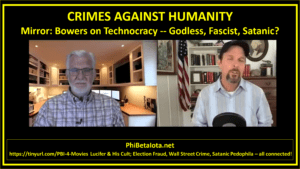
Alert reader from Europe adds this:
Continue reading “Mirror: Technocracy is Godless, Fascist, Wrong, & Satanic”

Alert reader from Europe adds this:
Continue reading “Mirror: Technocracy is Godless, Fascist, Wrong, & Satanic”

Judy Wood
How the Towers turned to dust April 1, 2011
I am delighted to finally see Dr. Judy Wood's book about the disintegration of New York's World Trade Center Twin Towers on September 11, 2001, appear in print. It has been a long time coming but well worth the wait.
Based in large part on her website and on the research she's been doing for over eight years, “Where Did the Towers Go?” is an exhaustive study of what happened to those two, quarter mile high, 110-storey skyscrapers on that horrible day and how they literally disappeared to dust. A structural engineering firm involved in building the Trade Center estimated there should have been almost 1.2 million tons of rubble. But, because we see mostly dust and unburned paper on the ground and a minimum of debris in the basements, Dr. Wood asks, “Where did it all go?”
With over 500 excellent color photographs, many charts and graphs, and solid calculations from an expert in mechanical and materials engineering, Professor Wood challenges the official story of 9/11 with compelling evidence that cannot be denied. Her study should convince anyone still skeptical of any alternative explanation as to what happened to the Towers that day that the generally accepted media and government explanation is utter nonsense.
Phi Beta Iota: We'll figure out the troop balance, probably by getting serious about Of, By, and Through IQ forces between now and July 2010–we do that or both the Democrats and Republicans are toast in November 2010. What merits deep reflection below is the mental health angle that ties in with the Fort Hood massacre. And while we're on that topic, RUSH AND CRUSH is the new paradigm for surviving armed attacks. See, Shout, Rush & Crush. Absent a gattling gun, no one should be able to hit more than three people with this strategy, and two of those will almost certainly live. From Virgiia Polytechnic to Fort Hood, citizens standing like sheep waiting to be murdered, is an indictment of our culture, education, and lack of leadership.

New Afghan War Headache: Not Enough Troops Available?
David Wood, 11/6/09
Just to maintain the 16 current brigades in Iraq and Afghanistan is, let's see, three times 16 is 48 and – oops! We're already out of BCTs! And here's the White House blithely batting around numbers like 40,000 more troops. That's roughly eight BCTs, which do not exist.
Below the fold: two key paragraphs on stress, battle performance after multipe tour, and suicides.
Continue reading “Journal: Out of Troops, Strategy, & Leadership”

Afghanistan Journal
(PoliticsDaily.com)
October 1, 2009
Obama's War: Take Your Time By David Wood
One brigade commander, Col. Michael Howard, is on his fourth tour in Afghanistan and understands it like few others. Still, there are pieces of this war that stop him cold. One of them is government corruption. “It's a cancer without a cure in Afghanistan, and if we don't come up with a cure, it will cause us to fail,” Howard told me last month, biting off his words angrily. . . . . . . . Given the stakes, Biddle said, “it is appropriate for the commander in chief to be aggressively challenging what he's told by anybody.'
Phi Beta Iota: Truth really is stranger than fiction. The White House is NOT getting the “full spectrum” intelligence it needs to make good decisions, for three simple reasons:
1. No one with access who has both strategic holistic vision and the integrity to demand that the President be fully and properly briefed on the ten high-level threats, the twelve harmonizing policies, and the costs and consequences of ignoring 8 out of 10 threats and 9 out of 12 policies. The President needs a mentor not a partisan nanny or a blindly obedient advisor.
2. A secret intelligence community leadership unable to think for itself and actually generate strategic matrices for the President that are helpful. Right now, using the long-standing OSS.Net, Inc. motto of “Information costs money, intellience makes money,” the US IC is a $75 billion a year sink-hole, largely worthless to the White House or Congress.
3. The President is still wrapped in the partisan bubble that got him elected–like Bush-Cheney, when backed by Wall Street, his insiders know how to steal elections, but they do not know how to govern. Phi Beta Iota persists in believing that Barack Obama could be the George Washington of the 21st Century, but he MUST find his own voice and a new set of advisors that combine strategic vision, integrity, and loyalty to the Constitution over the partisan crime family.

Col Michael J. Dziedzic is one of those very rare officers of such intelligence and integrity that he was able to run against the grain for years, focusing on the vital importance of civil-military operations other than war (OOTW) that were “buried” by a Chairman of the Joint Chiefs of Staff who said (we are not making this up), “Real men don't do OOTW.” Of course the Defense Science Board Report on Transitions to and From Hostilities (December 2004) and the current Secretary of Defense Robert Gates, say otherwise. Principle co-author with Ambassador Bob Oakley of Policing the New World Disorder, still the seminal work in the field, this is an officer, along with Colonel Ferd Irizzary, whom we hope to see earn multiple promotions as we all realize that a multinational multifunctional Earth Rescue Network is a non-negotiable first step to “getting a grip.” We hold this officer in the very highest esteem.
